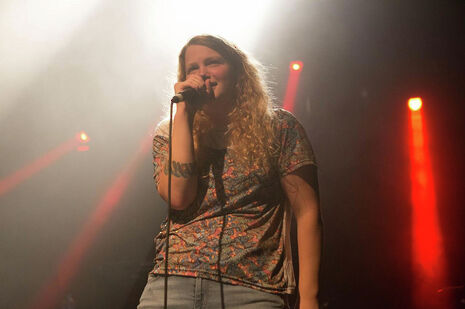The mainstream: friend or foe?
Watching spoken word artists rub shoulders with pop artists at festivals leaves Anna Jennings conflicted but hopeful for the future of spoken word

“I care about genius / I don’t care about celebrity / you only build them up to burn their effigies,” proclaims Kate Tempest in ‘Renegade’. Yet as I watched her perform to a half-interested audience at Bestival this summer, strolling across the stage she shared with Charli XCX and Duran Duran, I found myself confused about what the increasing popularisation of spoken word poetry means for the art form.
In the last couple of years, spoken word poetry has expanded massively as a genre, something mass markets have begun to acknowledge. Kate Tempest was shortlisted for the prestigious 2014 Mercury Prize. Cambridge’s own George the Poet was nominated for the 2015 Brits Critics’ Choice Award and receives airtime on BBC Radio One. Festivals, too, have begun to feature performance poets as main headliners rather than as niche acts.
As an enthusiastic English student who regularly argues with people who say they don’t ‘get’ poetry this is, on one level, fantastic. Finally, poetry is again becoming relevant, accessible, popular. It is fun. It can be danced to. But it still provides the profundity we have learnt to expect from poetry in its socio-political commentary, and its continued emphasis that there is something more to life than the banalities with which pop music commonly deals.
There is a sort of automatic recoil, however, to this popularisation of spoken word poetry. The obscure, esoteric and quite frankly confusing nature of modernist poetry has created a sense that poetry ought to be difficult and serious. In the twentieth century poetry became an occupation for the intelligent elite, and novels were firmly established as the literature for larger markets.
This means that there is something about spoken word poetry that doesn’t feel quite ‘right’. Can we label it poetry when it’s being broadcast on BBC Radio One, not Four? Is it poetry when it’s not being read in some darkened study, but rather danced to by a crowd of thousands? Is it a poem if we can easily understand it?
These are, of course, pretentious preconceptions, lazy stereotypes as to what a poem should be. We should celebrate, not snobbishly disdain, this revitalisation of poetry that attracts the interest of much wider and more diverse audiences. Spoken word poetry can in fact be seen as drawing the genre closer back to its roots – the earliest forms of poetry, such as the Homeric epic, were, we believe, performed set to music and enjoyed by large crowds.
However, the continual placement of spoken word alongside pop and rap music, both on the radio and at festivals, raises the question of how we ought to listen to it. If we are careless, it can become simply noise – the background hum of a radio, the sound you’re drunkenly dancing to. It is at this point, when the meaning is not listened to or cared about, that the popularisation of spoken word ceases to appear so positive.
In ‘Search Party’, George the Poet calls for “social enterprise / better education and decent wages”. His poetry is driven by a strong sense of racial and economic injustice, but do we really stop to consider this when it’s blasting from a radio or performed as a brief interlude between Jamie XX and Ella Eyre?
The popularisation of spoken word can become its undoing, as its very reason for being created is lost as it spreads to new media. Kate Tempest’s messages become problematic too. She attempts to directly and personally address the audience (“so if you want to talk just come find me”), and to show herself to be ‘ordinary’ (“sitting it out on my stoop with my shoes off … I’m you mate”). But when she’s under the spotlights in front of an audience of thousands these statements no longer seem genuine.
The careless popularisation of spoken word can leave it without meaning, without substance. But the solution to this is not to avoid popularising it, but rather to give it time to develop new techniques to combat the challenges it faces as a genre. The popularisation of the spoken word brings new energy, excitement, and funding to poetry, which is most certainly a good thing. The inevitable consequence is that the poetry is experienced in different ways – some profound and reflective, some, well, not. As I leaned in, sober, to hear Kate Tempest’s words, the fancy dress crowd behind me pushed into my back, shouting about a selfie. I sighed.
 News / SU stops offering student discounts8 January 2026
News / SU stops offering student discounts8 January 2026 Comment / Plastic pubs: the problem with Cambridge alehouses 5 January 2026
Comment / Plastic pubs: the problem with Cambridge alehouses 5 January 2026 Science / New year, new room, new you8 January 2026
Science / New year, new room, new you8 January 2026 Theatre / Camdram publicity needs aquickcamfab11 January 2026
Theatre / Camdram publicity needs aquickcamfab11 January 2026 Comment / What happened to men at Cambridge?31 December 2025
Comment / What happened to men at Cambridge?31 December 2025








